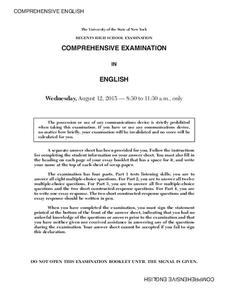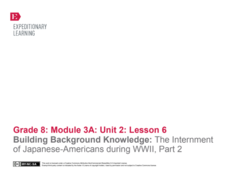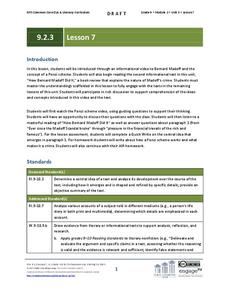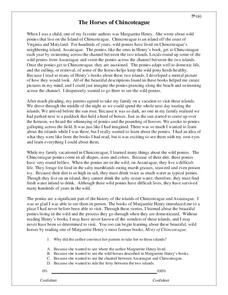Super Teacher Worksheets
Types of Clouds
What's the term for clouds that look like fluffy cotton balls? What about thick, gray clouds? Learn the names and descriptions for each type of cloud with a worksheet and activity. Learners read four columns of high-level, mid-level,...
EngageNY
Preparing to Write Historical Fiction: Determining Characteristics of the Genre
A language arts instructional activity helps young writers identify elements that make up historical fiction. First, it guides them through elements of fictional pieces with vocabulary cards. Then, pupils work collaboratively to...
Read Works
The What and Who of Elections
As citizens living in the United States, it is our civil duty to vote. But how does the voting process work? After reading a five-paragraph passage on the basics of elections and voting, young constituents respond to 10 questions based...
EngageNY
Grade 9 ELA Module 2, Unit 3, Lesson 12
As the first in a two-part, end-of-unit assessment that encourages readers to synthesize the unit's main ideas, class members review their notes for each of the three texts they read and develop three open-ended discussion questions...
Penguin Books
A Teacher's Guide to the Signet Classic Edition of William Shakespeare's Julius Caesar
Are the lessons of Shakespeare's Julius Caesar still applicable today? Explore themes, characterization, and plot structure with a thorough teacher's guide to the play. The resource covers the entire text and offers rigorous activities...
New York State Education Department
Comprehensive English Examination: August 2015
Looking at literature through a critical lens helps readers connect the text to the larger world. An essay examining the theme "There is no ill in the world without a remedy" forms the main part of a sample comprehensive English...
EngageNY
Researching Miné Okubo: Gathering Textual Evidence
Scholars read two texts about Miné Okubo’s life. In Riverside’s Miné Okubo and Miné Okubo, readers gather information to write narrative essays describing how Okubo became visible again. The essay serves as part of a performance task.
EngageNY
Mid-Unit 3 Assessments, Part 2: Summarizing, Analyzing and Discussing Research
Why is reading important? As part of the mid-unit assessment, scholars read, summarize, and analyze an article about the importance of reading. Additionally, they continue their discussion about whether their rules to live by should be a...
Worksheet Web
What did it Say? – Summarizing
Provide scholars with an opportunity to practice summarizing text with a two-page learning exercise. Learners read poems, share stories with their peers, and summarize their new-found-knowledge.
Bantam Books
The Martian Chronicles: K-W-H-L Activity
Prepare your class for a unit on Ray Bradbury's The Martian Chronicles with an activity that works for pre-reading, during reading, and post-reading. Learners fill out a K-W-H-L chart to reflect on what they already know, what they'd...
Museum of Disability
Ian’s Walk and Apples for Cheyenne
Help young learners understand friendship and empathy with two reading comprehension lessons. Each lesson focuses on a story about a child with autism, and encourages readers to compare and contrast the characters to each other and to...
Curated OER
The Old Man and the Sea: Questioning Strategies
Readers learn to ask questions about text with an activity based on Ernest Hemingway's The Old Man and the Sea. As they read, class members craft questions based on Bloom's Taxonomy and then find the answers themselves.
EngageNY
Building Background Knowledge: The Internment of Japanese-Americans during WWII, Part 2
Scholars learn about primary sources with a Primary Sources: Japanese-American Internment during World War II packet. Pupils work with a partner to read challenging sources in the packet while making notes in the margins. They then...
EngageNY
Grade 9 ELA Module 2, Unit 3, Lesson 7
After viewing an informational video that introduces Bernard Madoff and the concept of a Ponzi scheme, class members begin reading "How Bernard Madoff Did It," Liaquat Ahamed's New York Times book review that explains Madoff's crime, and...
Curated OER
Tangerine: Concept/Vocabulary Analysis
Designed for teachers who use Tangerine in the classroom, this resource provides background information on the novel, issues raised by the story, and literary devices Bloor employs. A good addition to your curriculum library.
EngageNY
Grade 9 ELA Module 3, Unit 1, Lesson 10
Finish your unit on Temple Grandin's Animals in Translation with a two-part written assessment. As ninth graders refer to their notes, annotations, and discussion guides from the first part of the unit, they prepare for a writing prompt...
EngageNY
Grade 9 ELA Module 3, Unit 1, Lesson 2
Autism isn't an illness or a disability. In the first chapter of Animals in Translation, we learn about Temple Grandin's unique ability to understand animals through her experience with autism. Having read pages four through eight for...
Read Works
Columbus Was an Explorer
Get the inside scoop on the European explorer, Christopher Columbus, with a response to reading worksheet that requires scholars to answer who, what, why, when, and a variety of other questions about the word crew.
Curated OER
The Horses of Chincoteague
How confident are your readers in responding to short reading passages? Find out with a worksheet that reinforces reading comprehension skills and requires self reflection on one's ability to read and answer questions pertaining to the...
EngageNY
Mid-Unit Assessment: Analyzing Idea Development in Chapter 3 of World without Fish
Half way there. Scholars work on the mid unit assessment for World without Fish. Learners work independently to complete the assessment. They then answer text-dependent questions and use sticky notes for annotating.
Mr. Nussbaum
Old Man of the Mountain
Young scholars read or listen to an informative text about a rock formation in New Hampshire. Following the reading, pupils answer five multiple-choice questions. A detailed progress report appears when class members complete the...
K5 Learning
The Great Sphinx Statue
Second graders read an informational text passage on the Great Sphinx, and answer questions based on what they read.
Mr. Nussbaum
The Color Green
A two-paragraph informative text takes a close look at the color green. Scholars listen to and or read the passage, then answer five multiple-choice questions. A progress report details learners' performance.
E Reading Worksheets
Main Idea Worksheet 4
Does your class or do individual learners need more practice determining the main idea of a passage of informational text? Here is a instructional activity containing seven exercises that asks kids to read short paragraphs, summarize the...

























